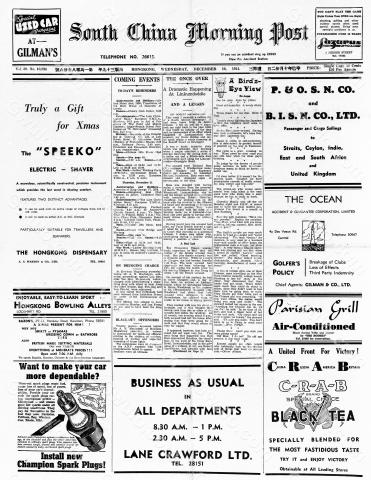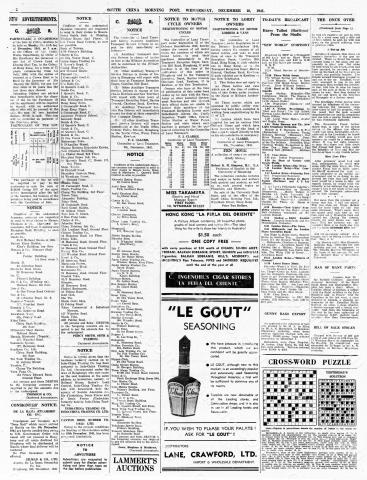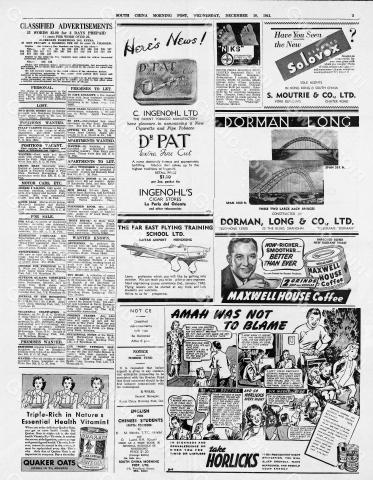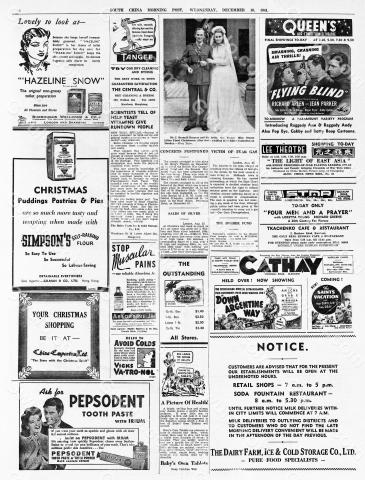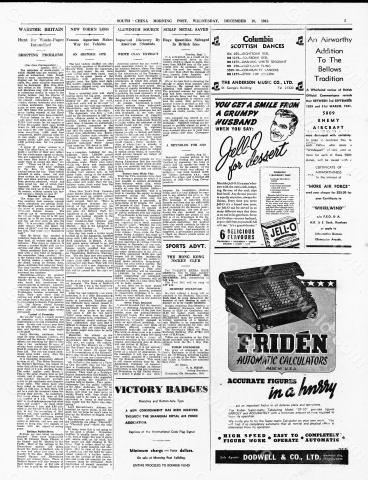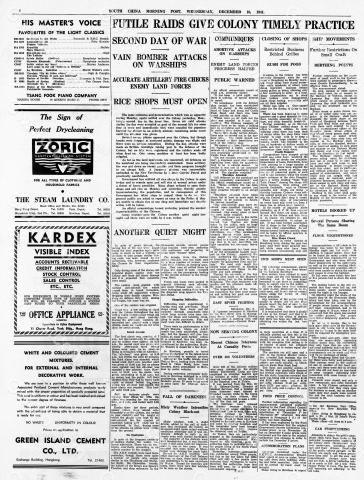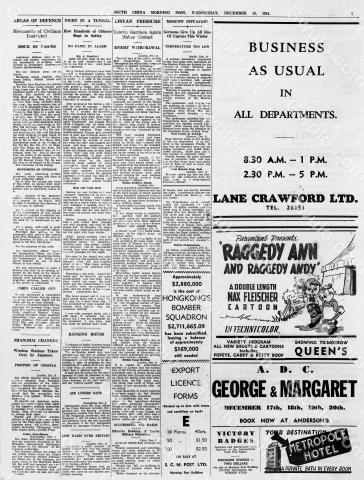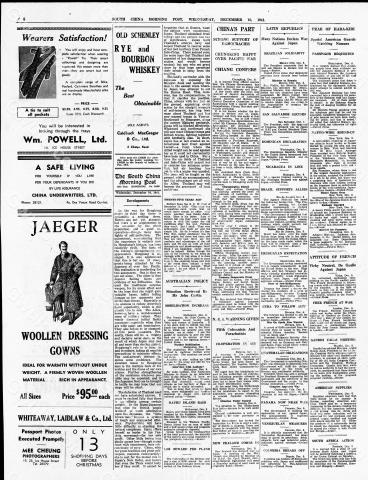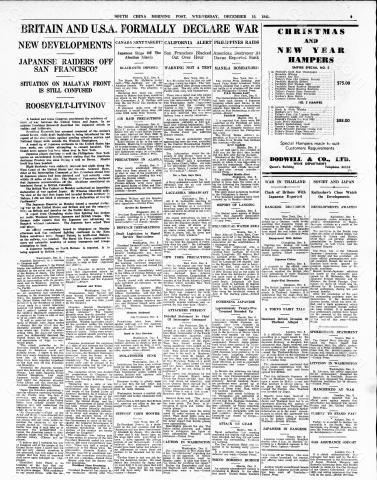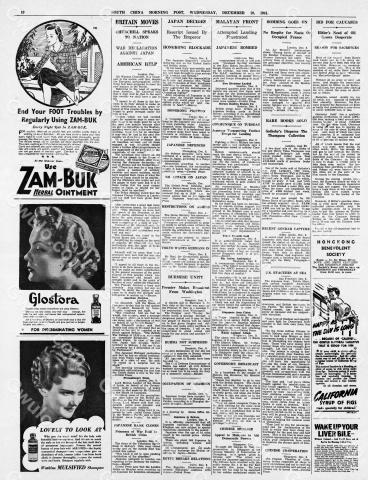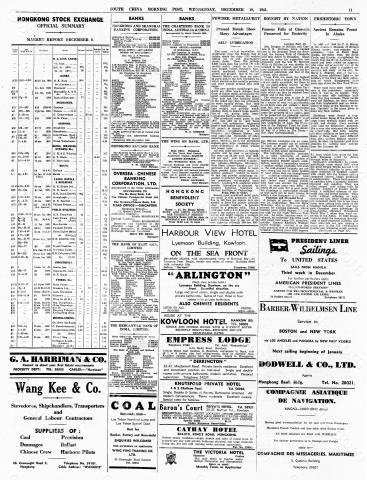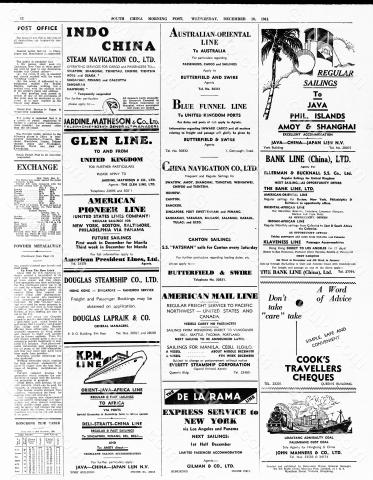The Shing Mun Redoubt, the key to the Gin Drinkers Line, is taken and the Royal Scots fall back to inadequate defensive positions on Golden Hill where they come under heavy attack. Indian regiments are fighting hard, and some of the young Canadians are sent into the battle, but as the fighting approaches urban areas, civilian casualties, mainly Chinese, start to mount.
The food situation in Kowloon's deteriorating. Yesterday the missionary Reiton family bought 'twelve large two and one-half loaves of bread'. Today their son-in-law Robert Hammond, also a missionary, finds that it's impossible to buy any bread at all.
Ellen Field goes to the Recruitment Centre and is told to leave Kowloon for the Island. She refuses:
I had the most fanciful notion of what would happen to me if I did remain where I was. I thought, for instance, that the Japanese would simply come up to me and say, 'We've won or something like that.' I believed they would behave decently towards British people.
After a heavy night of shelling, Arthur and Edith Hamson and their family decide to take refuge in the Kowloon hills for a few days. They head towards Lion Rock, passing other terrified families. Their servants Ah Moi and Ah Lee find them and bring food. Night falls 'and with darkness came the most spectacular light show'. From their elevated position they see Hong Kong Island covered in thick smoke, 'which took on an orange glow from the flickering light created by the bombs'. Lion Rock isn't comfortable, but at least it's safer than the city.
Diary of Dr. Isaac Newton:
Today has been one of the most trying that I have ever experienced. When I got to the hospital after breakfast, I found that there was a general air of tension and the nursing staff, sisters as well as nurses, had decided that in no circumstances would they stay put if the Japanese occupied Kowloon. As they had all agreed previously to do so when asked and our plans about stores etc. were based on that it was something of a blow to me.
Newton decides to cross to the Island and discuss the situation with the Director of Medical Services: on arrival he finds that Selwyn-Clarke has just seen the Governor, and he tells him that it is his (the Governor's) wish that all the hospital's medical personnel remain in Kowloon:
It was the first time I have ever seen S-C really moved. He obviously felt that he was deserting us and he really minded it, particularly as we have borne the brunt of the whole thing up till now. However, we settled all the details we could and he followed me out and said goodbye. There were tears in his eyes and he couldn't control his face or let the words out and in the end he gave it up and just walked back to his office. I felt really sorry for him. Then {Dr. D. J.} Valentine came up and said goodbye too.
On Hong Kong Island Phyllis Harrop describes the problems faced by Food Control:
Something has gone radically wrong with the organisation. Reports are coming in that men have had no food for forty-eight hours. Office staff have walked out due to lack of supplies and messengers are threatening to follow them. The food is there but transport seems to be the difficulty. Conferences have been held to settle the matter.
But action is being taken to improve the food situation: to alleviate the shortages caused by rice and other food shops shutting down at the start of the fighting, the Government orders every undertaking selling food to keep open from 8 a.m. to sunset. A Food Control official broadcasts an assurance that there's plenty of food in Hong Kong, and to prove it food kitchens are opened.
Jesuit Superior Father Patrick Joy needs to keep his priests moving about the city, as some of them, although Irish and therefore neutral, are volunteering with Essential Services, while others are continuing to carry out spriritual duties - from early on they note an increase in people wanting baptism, confession and communion. But there are new problems:
To move about the city now required police permits, and a large part of Fr. Joy's time on the third day of the war was spent in arranging for these.
One of the Jesuits, Fr. Paul O'Brien, is sent over to Kowloon to open an office of the Billeting Organisation, as so few people have been rehoused in the first two days - only 200-300 on the whole of day 2. He considers the building completely inappropriate as it's made mostly of glass and is the office of a Taxicab Company with an assembly yard outside that's likely to attract bombing as a transport hub. It's rocked for three hours during the day by the explosions from a nearby air raid. No-one comes there anyway, and he finds out later that notices were not issued until after the Japanese had taken Kowloon.
The London press is doing its best to stay positive. These reports seem to give an idealised account of developments on the 8th and 9th:
Japanese trying to cross Hong Kong’s mainland frontier have been halted by our artillery fire, it is announced officially.
The border was manned by British troops at 5.30 a.m. yesterday and we started the demolition of roads and bridges.
Berlin adds that two Japanese Divisions are attacking Hong Kong.
Sources:
Shing Mun etc.: Tony Banham, Not The Slightest Chance, 2003, 40-42
Reiton: Robert B. Hammond, Bondservants of the Japanese, 1957 ed., 16
Field: Ellen Field, Twilight in Hong Kong, 1960, 20-21
Hamsons: Allana Corbin, Prisoners of the East, 2002, 73-74
Newton: Alan Birch and Martin Cole, Captive Christmas, 1979, 24-25
Harrop: Phyllis Harrop, Hong Kong Incident, 1943, 70
Action is taken: Alan Birch and Martin Cole, Captive Christmas, 1979, 23
Joy: Thomas F. Ryan, Jesuits Under Fire In The Siege Of Hong Kong, 1944, 23
O'Brien: Ibid, 25
Press: The Daily Mirror, December 10, 1941, page 1
